|
Cycle 8 (2019 Deadline)
Recommendations for decision makers with concerns on forest fire policies
PI: Dolors Armenteras (darmenterasp@unal.edu.co), Universidad Nacional de Colombia
U.S. Partner: Jennifer Balch, University of Colorado, Boulder
Project dates: December 2019 - December 2021
Project Overview:
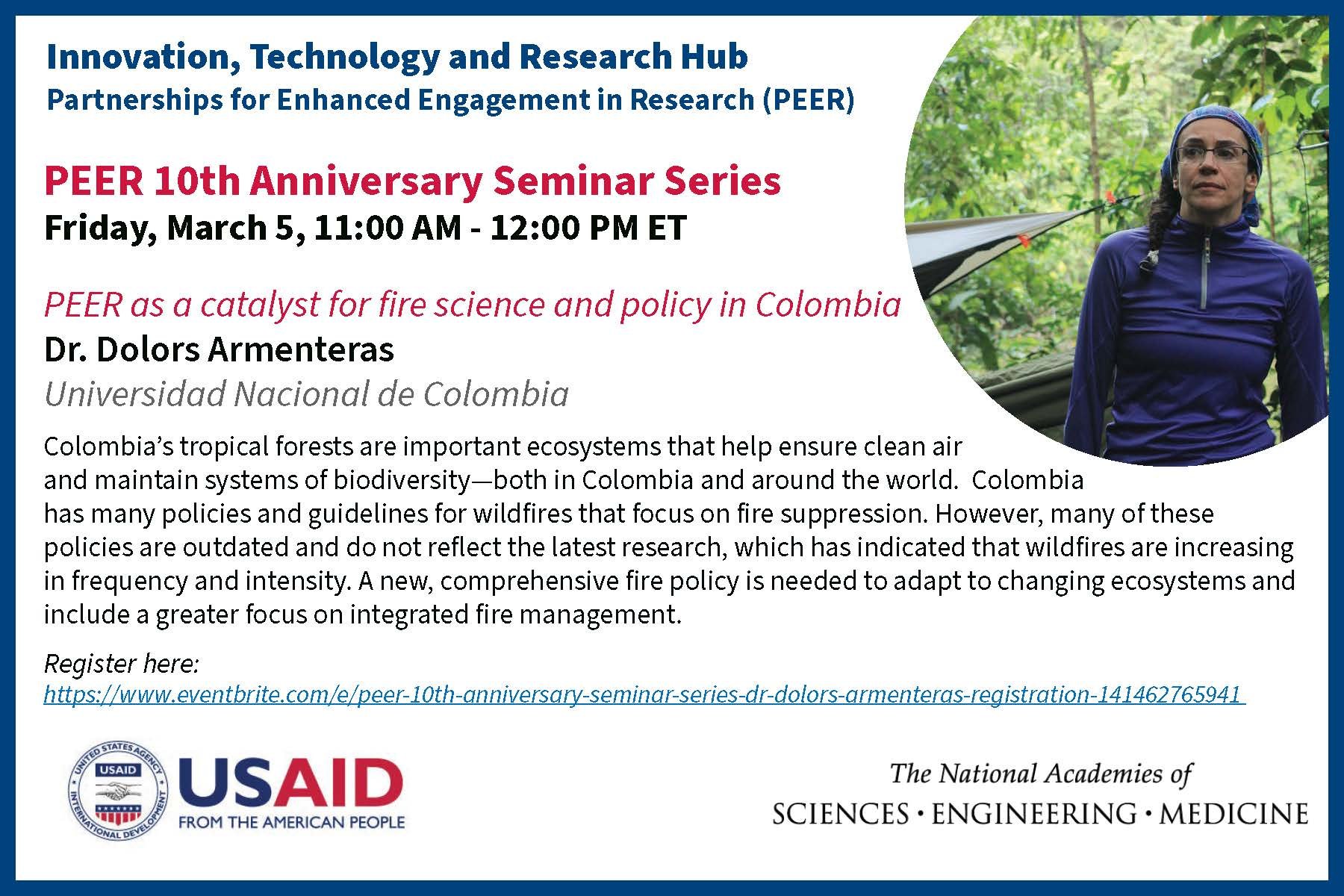 | | PEER 10th Anniversary Speaker Series' recording |  | | BBC World News service featured an interview with Dolors Armenteras in their recent episode on The Women who protect nature which aired February 21, 2021. | 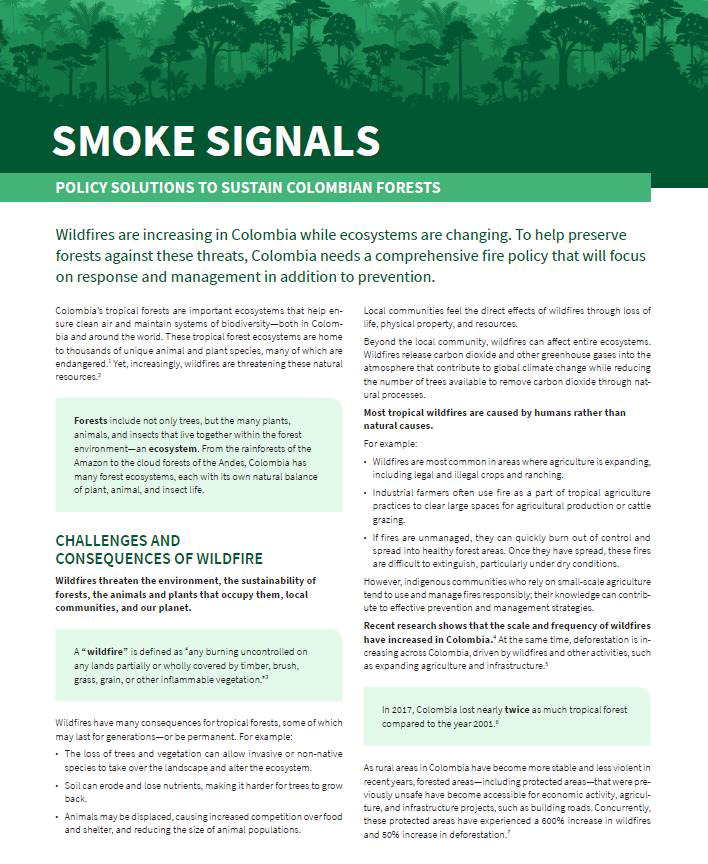 | | This document was produced by Population Reference Bureau under the Research Technical Assistance Center (RTAC).The information presented in this factsheet is based on research led by Dr. Dolors Armenteras, with Tania Marisol González, Maria Constanza Meza Elizalde, Laura Isabel Mesa, Joan Sebastian Barreto, Natalia Salazar, and Alejandra Reyes at the National University of Colombia |
Deforestation in Colombia has been linked strongly to the use or misuse of fires for agriculture and pasture management or directly to occupy land. A six-fold increase in fires has been reported in protected areas across biodiversity hotspots in areas formerly occupied by the Fuerzas Armadas Revolucionarias de Colombia (FARC) guerrillas. Understanding how the transition from conflict to post-conflict is affecting forests is crucial to mitigating both carbon emissions and biodiversity loss in Colombia. This project seeks to impact policy related to fire at the national level and help reduce fire risk in the country. The PI Dr. Armenteras and her colleagues aim to integrate research into support processes for institutions, companies, and local communities that are willing to contribute to the prevention and management of forest fires to reduce risk. This plan would be a cross-cutting element to support the management of forest fire risk at local, regional and national levels. Thanks to a PEER Evidence to Action Supplement on her grant under PEER Cycle 5, Dr. Armenteras and her group worked together with the National Natural Parks of Colombia (PNN), achieving the implementation of a proposal of criteria and indicators to strengthen planning tools for the management of protected areas (PAs), so that the degradation of forests by forest fires can be prevented. This result serves as the foundation for the execution of this new PEER Cycle 8 project focused on the development of policies aimed at reducing the risk of fires in the face of climate change. This, in turn, will allow the strengthening of the PNN entity, which favors territorial development and the conservation of biodiversity, thus benefitting the populations surrounding the PAs.
The project will begin with a critical analysis of policies related to fire management, including laws, decrees, and national plans, followed by an expert workshop to build a SWOT matrix and identify strengths, weaknesses, opportunities, and threats associated with current policies. Likewise, the documents collected will be analyzed in detail to identify specific information and policy gaps in protected areas that are required for the design of prevention strategies, fire control, and management of areas affected by fire, particularly national parks. One park will be selected for the implementation of a proposed set of indicators to be used as a management tool by park officials. A workshop will be held with the community in and around the park to learn more about their perception of the use of fire, forest fires, and the impacts generated by these events. At the national scale, the project also aims to contribute to the formulation and implementation of forest fire-related policy.
Final Summary of Project Activities This project aimed to integrate politics and planning to advance territorial fire management through governance by December 2021, achieved a series of substantial impacts across Colombia. Their approach involved collaborating closely with local stakeholders and institutions to devise effective strategies for wildfire prevention and management. One of the project's key achievements was the development of a participative protocol specifically tailored for the Bita River basin in the Orinoquia region. This protocol, created in partnership with Ecolmod, NGOs like Fundación Omacha and Fundación Orinoquia, and the network of Natural Reservoirs of Civil Society, was instrumental in integrating comprehensive fire management practices into the Bita River Management Plan. By engaging local communities and stakeholders in the development process, the protocol not only addressed immediate wildfire risks but also fostered long-term sustainable practices in the region. In another heavily impacted area, the Farmers Reserve Zone of Sumapaz in Bogotá, the PEER team conducted participatory workshops. These workshops were aimed at understanding local perceptions of fire and its impacts among community leaders. Based on insights gathered, the team drafted a proposal embedded within the Sustainable Development Plan for the Reserve Zone. This proposal outlined strategies for responsible fire use and aimed to reduce the occurrence of wildfires, thus promoting environmental stewardship and community resilience. Furthermore, the PEER project aligned its efforts with Colombia's broader goals of low-carbon sustainable development in the Orinoquia region. By synergizing with related initiatives such as the "Degradation of Tropical Forests in Colombia: impacts of Fire" project, the team contributed directly and indirectly to reducing greenhouse gas emissions. Collaborations with the private sector, notably with Forest First Forestry Company, were pivotal. This partnership not only secured additional funding but also enabled research into the effects of fire and effective prevention strategies, crucial for minimizing losses in the forestry sector. At a national level, the PEER team's impact extended into legislative arenas. They conducted a thorough review of Colombia's existing laws, norms, and policies related to wildfires. This review identified strengths and gaps, which informed the drafting of bill proposals, including the influential Bill 221 of 2019 and the National assessment plan for wildfire prevention and control. Their efforts also resulted in the inclusion of a new article focused on wildfire prevention within Bogotá's strategic development plan, underscoring the project's influence on urban planning and environmental policy at a municipal level. Spatial data analysis using VIIRS data from 2012 to 2019 provided critical insights into the density and frequency of active fires and burned areas. This data was shared with the Ministry of Housing, City, and Territory to inform the development of guidelines and strategies aimed at reducing wildfire risks in rural fire-prone areas. The PEER team's action framework for disseminating knowledge on integrated fire management also played a crucial role in shaping national policies on deforestation and sustainable forest management. Through comprehensive training programs, the PEER project enhanced the understanding of wildfire dynamics among legislative technical units in the Congress of Colombia and institutional stakeholders. They conducted workshops and provided practical training on fire patterns, wildfire management concepts, and policy analysis, thereby strengthening local and regional capacities for fire management. Looking ahead, beyond the completion of the PEER project, Dr. Armentera's team continues their impactful work. They have initiated an ongoing initiative funded by Colombia's royalties program, focusing on the "Management of fire-resilient multifunctional landscapes under climate change scenarios" in the Orinoquia region. This initiative aims not only to fortify local capacities but also to shape national action plans and policies, using specialized participatory tools tailored to the region's unique environmental conditions. By empowering local communities, engaging with students and emerging researchers, and advocating for sustainable practices, the team strives to generate significant environmental impacts locally within Colombia and globally. Publications
Armenteras, D. Dávalos, L.M. Barreto, J.S. Miranda, A. Hernández-Moreno, A. Zamorano-Elgueta, C. González, T.M. Meza, M.C. Retana-Alumbreros, J. 2021. Fire-induced loss of the world’s most biodiverse forests in Latin America. Science Advances. Vol. 7, no. 33, eabd3357. DOI: 10.1126/sciadv.abd3357 Armenteras, D., T. M. González, J. O. Vargas, M. C. Meza Elizalde, and I. Oliveras. “Incendios en ecosistemas del norte de Suramérica: avances en la ecología del fuego tropical en Colombia, Ecuador y Perú”. Caldasia, vol. 42, no. 1, Jan. 2020, pp. 1-16, doi:10.15446/caldasia.v42n1.77353.
Barreto, J.S.; Armenteras, D. Open Data and Machine Learning to Model the Occurrence of Fire in the Ecoregion of “Llanos Colombo–Venezolanos”. Remote Sens. 2020, 12, 3921.. https://doi.org/10.3390/rs12233921
Driscoll, D., et al. "How fire interacts with habitat loss and fragmentation." Biological Reviews, 2021, https://doi.org/10.1111/brv.12687
González, T.M. González-Trujillo, J.D. Muñoz, A. Armenteras, D. 2021. Differential effects of fire on the occupancy of small mammals in neotropical savanna-gallery forests. Perspectives in Ecology and Conservation. https://doi.org/10.1016/j.pecon.2021.03.005 Meza, M. C., Espelta, J. M., González, T. M., & Armenteras, D. (2023). Fire reduces taxonomic and functional diversity in Neotropical moist seasonally flooded forests. Perspectives in Ecology and Conservation, 21(2), 101–111. https://doi.org/10.1016/j.pecon.2023.04.003
Tebbutt, CA, Devisscher, T, Obando-Cabrera, L, et al. Participatory mapping reveals socioeconomic drivers of forest fires in protected areas of the post-conflict Colombian Amazon. People Nat. 2021; 3: 811– 826. https://doi.org/10.1002/pan3.10222 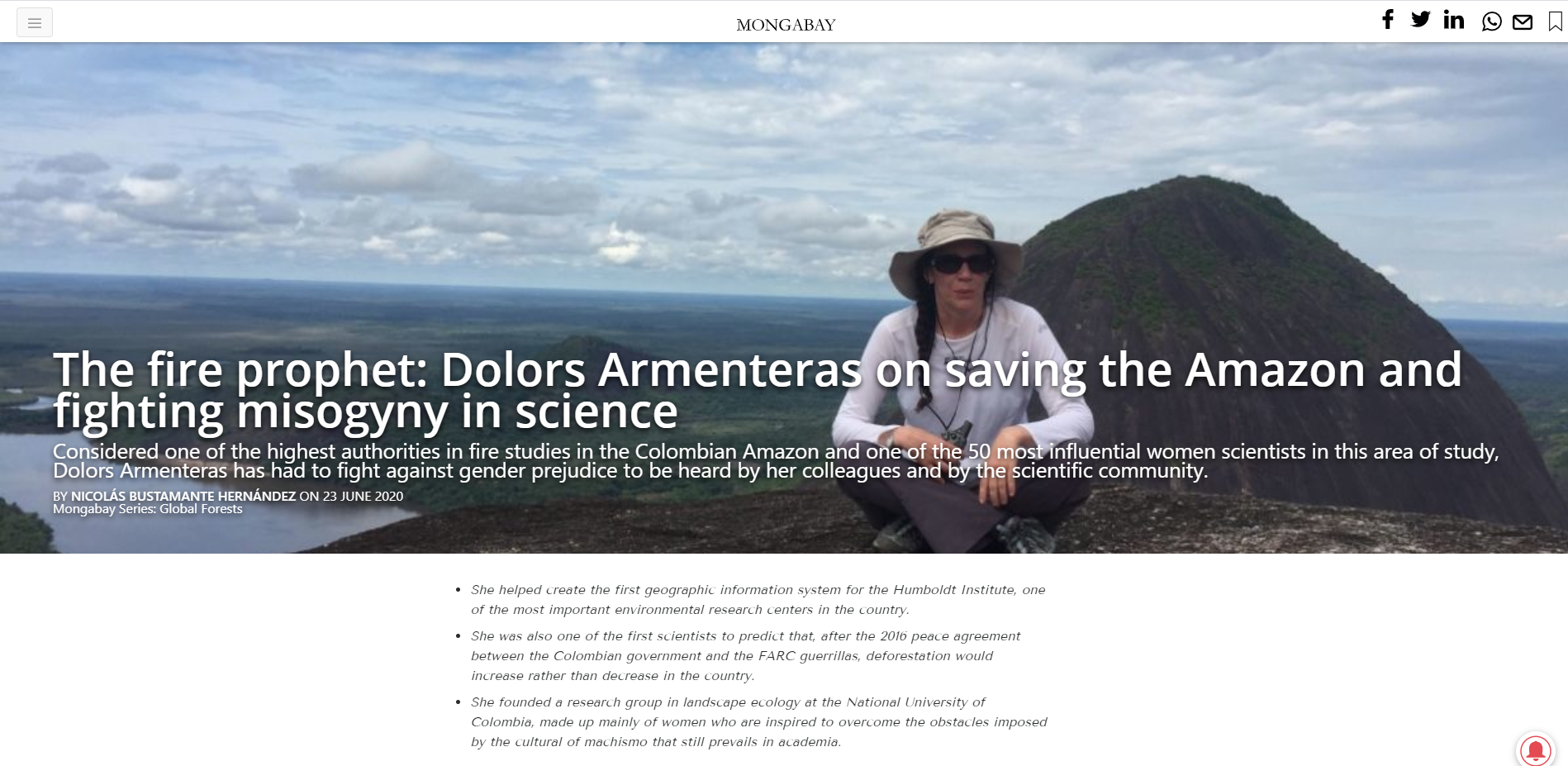 | Mongabay News features Dolors Armenteras as a pioneer and one of the most prominent experts on fires and landscape ecology in the Colombian Amazon.
|
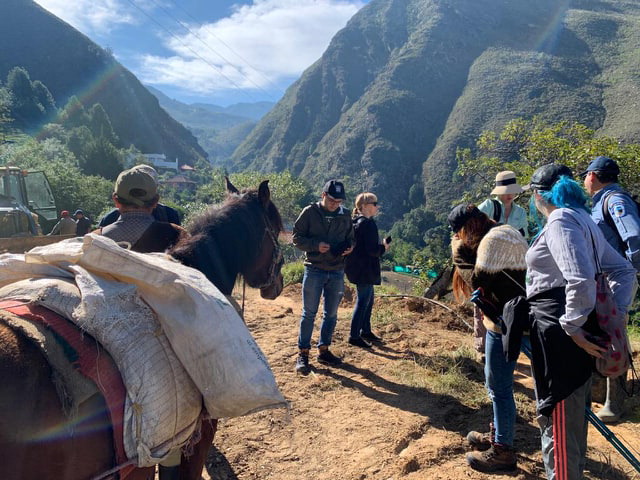 | 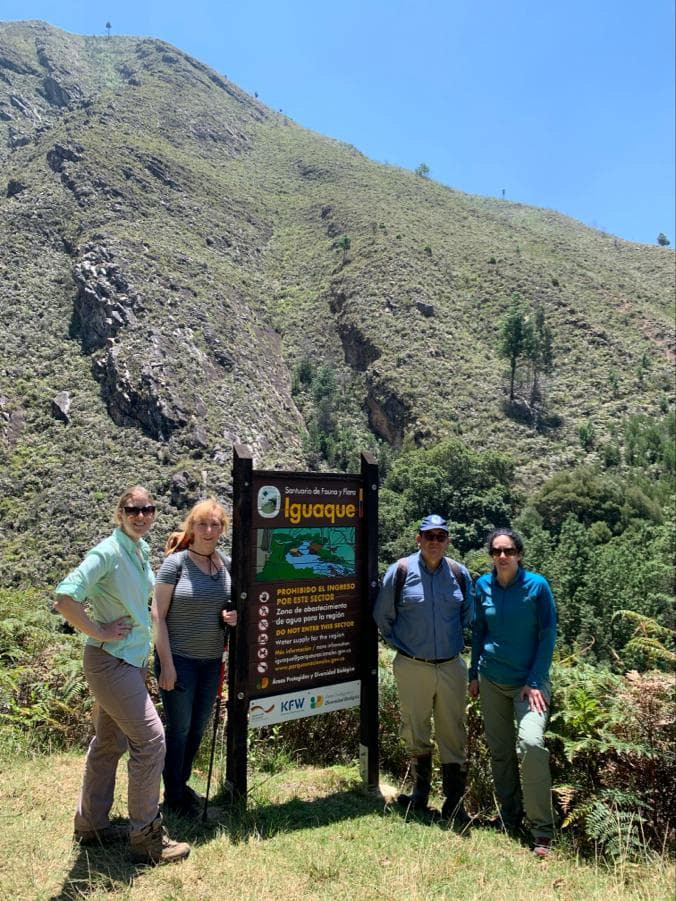 | | Lily Sweikert (USAID) and Kelly Robbins (NAS) visit Dolors' PEER project site in Iguaque, Colombia, March 2020 | Photos credit: Dolors Armenteras |
Back to PEER Cycle 8 Grant Recipients
|
|
|
|









